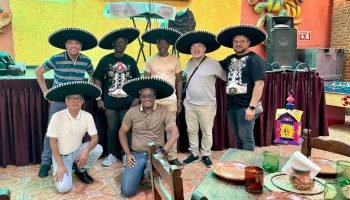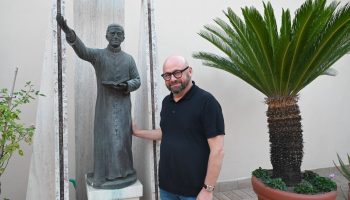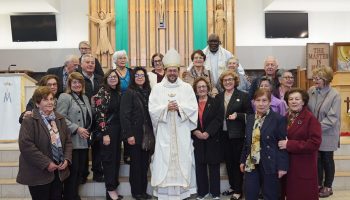
The Consolata missionaries working in Venezuela gathered for their IX Conference with the motto “Wayfarers of consolation and hope”. With this meeting, the group wants to reconnect with the words that have often inspired the Founder, the Blessed Joseph Allamano: “Console, console my people” (Is 40.1).
By Beni Kapala *
This moment of grace is taking place from 8 to 12 July at the Missionary Animation Center (CAM) of Barquisimeto with the participation of the members of the General Direction, Father James Lengarin, Father Michelangelo Piovano and Father Juan Pablo De los Rios, who arrived from Rome, and the 14 Consolata missionaries together with three Lay Consolata Missionaries (LMC), all working in the missions of Caracas, Barlovento, Barquisimeto, Tucupita and Nabasanuka.
This is also a joyful occasion to welcome the new missionaries who join our Delegation. Our mission in Venezuela is to offer the same consolation that God himself offers to all humanity.
The General Councilor for America, Father Juan Pablo, recalled the words of Pope Francis who invites us not to forget that we are an outgoing Church, underlining the need to focus on the ad gentes of our Institute.

“The goal of every Christian is to be a missionary disciple and to make others disciples. Each one personally must reflect on his ability to leave our comfort zone, our personal interests, and to let the Spirit to operate, work in unity of intent, aiming at the same goal”.
The speaker then indicated some specific traits of our missionary spirituality:
1. The conviction of having received a call from God and the decision to respond to it with freedom and responsibility. Called to be a blessing and to advance the passion for the Kingdom.
2. Overcoming the fear of going beyond frontiers, in agreement with the document of the XIV General Chapter (n.24). Overcoming not only geographical frontiers, but also religious, spiritual, existential and sociological ones, accepting the unknown with the ability to open up and letting ourselves be surprised to meet God and find him among the most disadvantaged.
3. Walking with humanity as part of a people, of a community that moves, grows and changes.
4. To be witnesses of reconciliation. Our personal and collective histories are also marked by violence, which has left many fractures. We must commit ourselves to promoting the reconciliation that is at the heart of the Gospel. Consolation implies all this and Jesus Christ is the means to achieve it.
5. Openness to dialogue: an integral dialogue that seeks what unites us and highlights the experience of God.

The reality of Venezuela
We were helped by the presence of the experienced Jesuit Father Manuel Zapata, sociologist, researcher and friend of the Institute, in presenting and reflecting on the reality of Venezuela,. Father Manuel offered his intervention as a discernment and a profound look at what we are experiencing in the country. “Looking at the reality can generate anguish and desperation, but it can also help to discover the manifestations of the Spirit of God that accompanies people”, and he continued: “There are factors that hinder progress, but in the Venezuelan people there is also a very high resilience strength that manifests itself in the way people move forward, even in the face of adversity.”
In Venezuela there are different forms of poverty and social exclusion: we can talk about economic poverty; of social poverty resulting from a lack of opportunities and high levels of social inequality; human poverty or anthropological impairment; of spiritual poverty in the deterioration of values; of educational poverty which manifests itself, among other forms, in difficulty to accessing communication and information technologies.
Poverty in its various realities concerns 51.9% of the population. 89% suffer from food insecurity. There are problems with public services, education and healthcare across the country.

The migration continues
There is talk of 8 to 9 million Venezuelans, especially young people, who have emigrated to other countries and many continue to migrate, waiting for a possible political change. The consequences of this migratory phenomenon include the aging of the population, the increase in children unaccompanied by their parents and entrusted to grandparents or other relatives. There is great resentment towards the state due to the migration problem. Digital pornography is widespread as a consequence of vulnerability, as well as the presence of human trafficking situations.
At a psychosocial level, Venezuela presents multiple wounds due to the fragmentation of social communities, families and even Christian communities. Reconciliation is a necessity in the country, even if we don’t know or there isn’t a concrete proposal on how to implement it.
As highlighted above, however, the high resilience of Venezuelans is positive and despite the significant deterioration in mental health and the increase in suicides, optimism is still high in the country.

The history
The Consolata missionaries arrived in Venezuela in 1970 with Father Giovanni Vespertini, initially in the diocese of Trujillo, taking over the parish of La Quebrada. In 1974, with the arrival of Father Francesco Babbini, the IMC Venezuela Group became independent under the responsibility of the General Government, detaching itself from the Colombia Region. In 1982 the Group became a Delegation, dedicated to the Virgin of Coromoto, patron saint of Venezuela.
There are currently 15 Consolata missionaries from different countries working in Venezuela: in Caracas (Carapita neighborhood and in the headquarters of the Delegation), Barquisimeto (Missionary Animation Centre), Barlovento (Afro pastoral care in four parishes), Tucupita and Nabasanuka (Indigenous pastoral care with the Warao people). Monsignor Lisandro Rivas Durán, IMC, is auxiliary bishop of the Archdiocese of Caracas.

The Consolata Missionary Sisters (MC) also operate in Venezuela, and the Consolata Lay Missionaries (CLM) are present in various missionary activities.
The program of the IX Conference continued with group work on our realities as an IMC Delegation. The days always ended with a moment of prayer animated by the different teams according to the missionary options: indigenous pastoral care, Afro pastoral care, urban pastoral care, MAVP, etc.
* Father Beni Kapala, IMC, Consolata Missionaries Venezuela’s communication office.





